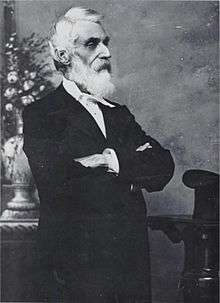Walter M. Gibson
| Walter M. Gibson | |
|---|---|
 Photo of Walter M. Gibson | |
| Prime Minister of Hawaii | |
|
In office June 30, 1886 – October 13, 1886 | |
| Monarch | Kalākaua |
| Preceded by | Celso Caesar Moreno |
| Succeeded by | William C. Wilder |
| Minister of Foreign Affairs | |
|
In office May 20, 1882 – June 30, 1886 | |
| Monarch | Kalākaua |
| Preceded by | William L. Green |
| Succeeded by | Robert J. Creighton |
| Minister of the Interior | |
|
In office June 30, 1886 – October 13, 1886 | |
| Monarch | Kalākaua |
| Preceded by | Charles T. Gulick |
| Succeeded by | Luther Aholo |
| Minister of Foreign Affairs | |
|
In office October 13, 1886 – July 1, 1887 | |
| Monarch | Kalākaua |
| Preceded by | Robert J. Creighton |
| Succeeded by | Godfrey Brown |
| Personal details | |
| Born | March 6, 1822 |
| Died |
January 21, 1888 San Francisco, California |
| Resting place | Hawaii |
| Nationality | Kingdom of Hawaii |
| Political party | National |
| Religion | The Church of Jesus Christ of Latter-day Saints |
| Signature |
|
Walter Murray Gibson (March 6, 1822 – January 21, 1888) was an American adventurer and a government minister in the Kingdom of Hawaii prior to the kingdom's 1887 constitution.
Life
Gibson was generally thought to be born March 6, 1822, in the southern United States,[1] though he sometimes claimed to have been born in England.[2] He was the captain of a ship and became involved in gunrunning in the Caribbean.[1] Later, he was jailed in the East Indies by the Dutch on charges of fomenting rebellion, but managed to escape from his prison in Java. In 1859, he went to Utah Territory and joined The Church of Jesus Christ of Latter-day Saints (LDS Church), persuading church president Brigham Young to allow him to establish a Mormon colony in the Pacific.[3]
Gibson arrived in the Hawaiian Islands in 1861, and founded a colony among Mormons already in the islands. He purchased land on the island of Lanai with funds from the colony in his own name, but was excommunicated after an LDS Church investigation regarding accusations of preaching false doctrine, maladministration of the colony,[4] and embezzlement of church funds.[1] Upon excommunication, he expelled those who did not support him from his colony and church[5] and began angling for secular political office and power.
In 1873, Gibson started his own newspaper to extol his virtues in English and Hawaiian called the Nuhou. He successfully ran for the House of Representatives in 1878[6] as a candidate of the King's Party, allying himself with King Kalakaua and portraying himself as the "voice of Hawaiians". In 1880 he bought the Pacific Commercial Advertiser (now the Honolulu Advertiser).[7] In 1882, he was appointed Minister of Foreign Affairs, and then on June 30, 1886, prime minister of the Kingdom of Hawaii by King Kalākaua. He also served on various boards, as Attorney General, Minister of Interior, and Secretary of War.[6]
Gibson was widely credited with encouraging Kalākaua to make rash political moves, which eventually led to the imposition of the 1887 Constitution of the Kingdom of Hawaii. One of his bolder plans included an attempt to build a Pacific Empire, which drew the ire of both the international and local Hawaiian communities.[1]
Gibson's fortunes fell dramatically after being taken out of power in 1887. He fled the islands for fear of losing his life and died penniless in San Francisco on January 21, 1888. His body was returned to Hawaii for a funeral and burial.[1]
References
- 1 2 3 4 5 Will Hoover, "Walter Murray Gibson", Honolulu Advertiser, 2006-07-02
- ↑ James Warren Gould (1960). "The Filibuster of Walter Murray Gibson". Annual report of the Hawaiian Historical Society. Hawaii Historical Society. pp. 7–32. hdl:10524/56.
- ↑ Andrade Jr., Ernest (1996). Unconquerable Rebel: Robert W. Wilcox and Hawaiian Politics, 1880-1903. University Press of Colorado. p. 11. ISBN 0-87081-417-6.
- ↑ Gibson was reportedly selling leadership positions in the church to native Hawaiians.
- ↑ Sometimes referred to as the "Church of Jesus Christ of Latter Day Saints (Gibsonite)" or the "Gibsonite Mormons".
- 1 2 "Gibson, Walter Murray office record". state archives digital collections. state of Hawaii. Retrieved 2010-03-20.
- ↑ Bob Krauss, "Advertiser boasts a storied history", Honolulu Advertiser, 2004-08-22.
Further reading
- Walter M. Gibson (1855). The prison of Weltevreden: and a glance at the East Indian Archipelago. J. C. Riker.
- Walter M. Gibson (1881). Sanitary Instructions for Hawaiians.
External links
 Media related to Walter M. Gibson at Wikimedia Commons
Media related to Walter M. Gibson at Wikimedia Commons
| Government offices | ||
|---|---|---|
| Preceded by William L. Green |
Kingdom of Hawaii Minister of Foreign Affairs May 1882 – June 1886 |
Succeeded by Robert J. Creighton |
| Preceded by Edward Preston |
Acting Kingdom of Hawaii Attorney General May 1883 – December 1883 |
Succeeded by Paul Neumann |
| Preceded by John E. Bush |
Acting Kingdom of Hawaii Minister of the Interior July 1883 – August 1883 |
Succeeded by Charles T. Gulick |
| Preceded by Charles T. Gulick |
Kingdom of Hawaii Minister of the Interior June 1886 – October 1886 |
Succeeded by Luther Aholo |
| Preceded by Robert J. Creighton |
Kingdom of Hawaii Minister of Foreign Affairs October 1886 – July 1887 |
Succeeded by William L. Green |
